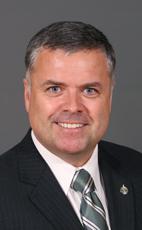Mr. Speaker, while my riding does not in any way touch upon an international bridge, it is said that the people of Albert county are so fiercely independent they are a separate country and the new bridge that spans the mighty Petitcodiac probably took so long because of the international aspect.
My friend brought up an aspect of infrastructure. In municipal infrastructure, provincial and federal programming has been working terribly well in our province and in our region. There are programs like CSIF, on strategic infrastructure, and MRIF, for municipal rural infrastructure programs, which we fell might be under attack in the coming days as an effort by the government to redo or redress what it perceives to be the fiscal imbalance.
I fear, and I ask the hon. member for his comment, that money will be taken out of infrastructure programs that might otherwise help to update bridges and roads in our communities. I fear that the money will be taken out of those programs, with those programs collapsing like the bridges the member referred to from 1918 and 1938, and will be put into provinces for other purposes that are laudable but are not infrastructure purposes.
Does the hon. member feel that these infrastructure programs are very important to municipalities and communities around our country that face deplorable states of aging infrastructure?

